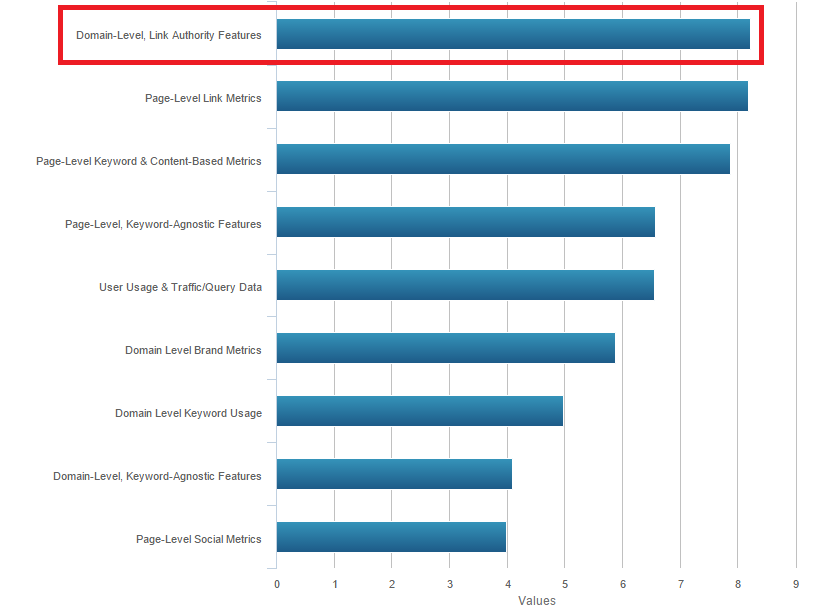Lots of things are biennial. The Ryder Cup. Congressional elections. Public displays of boorishness by Alec Baldwin.
These are all generally familiar to the public at-large. The search engine ranking factors survey conducted by Moz, however, is not. In fact, when you ask your friends about the signals that determine the rankings for search engines, you’re likely to get the following response:
As clueless as non-SEOs usually are, even professional search marketers really don’t know for sure all of Google’s 200+ ranking factors. All we can really do is make educated guesses and infer from case studies. Lots and lots of case studies.
The only people who know all of the components within the algorithm work at 1600 Amphitheatre Parkway in Mountain View, California.
There’s about zero chance that Google will ever make their algorithm public-facing. On the scale of likelihood, it resides next to kale on the menu at Texas Roadhouse.
We may never know everything, but we know some things. Google themselves have dropped little morsels of information from time-to-time. The panic from Mobilegeddon never would have occurred had Google not announced mobile compatibility as a forthcoming signal. The same goes for the HTTP vs. HTTPS conundrum from a year ago.
Those two examples are very recent inclusions. There is one signal that we’ve known about since the beginning: Links.
In the Beginning…
Google was introduced in 1996, but it originally was not known as Google. It was BackRub, a search engine exclusive to the campus at Stanford University. Why Stanford? That’s where founders Larry Page and Sergey Brin were both students.
The Stanford duo were hardly the first people to come up with the idea for a search engine. Despite the internet’s infancy at the time, there were already a handful of search engines, none of which ever hoarded the market.
Despite national brands like AltaVista and Lycos, BackRub quickly became the search engine of choice at Stanford and surrounding campuses. That’s because Page and Brin wrote the algorithm to heavily weigh the value of inbound links. No other engine was doing that.
Page and Brin’s academic background lent them insight when writing the algorithm. Every research paper a student at Stanford has to write must contain a series of relevant and informed sources. The more you can validify your thesis with such sources, the better. And a footnote citation is a signal of trust from student to source.
Page and Brin simply applied this principle to the world of search. A link is site A’s endorsement of site B. The more relevant links, the better.
After the success of BackRub, Page and Brin saw it fit to develop a similar search engine for the consumption of the entire world: Google.
UX vs. Them
Now every major search engine wraps links into the ranking signals. The Russian engine Yandex dropped links from their factors in December 2013, but they were reintroduced in April 2015, marking the first time in Russian history anything reappeared.
To be fair, Google didn’t ascend straight to the top. It battled competition from the likes of Yahoo, Bing and that annoyingly ostentatious butler.
And Google has done more since 1996 to carve their spot as the world’s most popular search engine, like introducing additional products to increase brand awareness. But there’s no doubt that the decision to algorithmically include links elevated Google to the point where it could dominate the market.
And dominate it does.
Last March, Google accounted for 64% of searches. To give you an idea how big of a number that is, Ronald Reagan dominated Walter Mondale in the 1984 presidential election by winning 49 out of 50 states, yet grabbed only 58.8% of the popular vote, 5.2% short of 64%.
As mentioned previously, Google has released a series of free products that have extended their reach in the tech apparatus, but their success still ultimately depends on trust.
A search engine’s worth is entirely predicated upon the quality of the results it delivers. If you’re a search engine, you never want to hear
Author note: Unconfirmed reports suggest that Apple’s forthcoming search engine will return a free U2 song for every query.
Just like the websites they rank, search engines fight their competitors over better user experience. Google makes 90% of its revenue from paid advertising on search results. It needs you to keep searching.
Yes, Google is incredibly dominant, but there is precedent for sites with hefty market shares declining in rapid fashion. Don’t believe me? Add me on myspace and send me a DM about it.
The Staying Power of Links
The internet changes. For one thing, I can write this on an online document without having to log off when my roommate has to make a call. Not only does the internet change, but it changes our behavior as well. I used to make a point of being on time to movie theaters so I could watch the previews. Now because of YouTube, I can spend more time in the concession lobby, asking myself which overpriced snack I’d like to give me heart disease today.
There is so much that is unmistakably different about the internet of 1995 vs. the internet of 2005 vs. the internet of 2015. But as Moz’ survey concludes, there is one constant: the power of links.
Bear in mind this is a survey and not an exact science. But Moz carefully selected the sample to highly-experienced people within the industry, people who put the “expert” in “expert opinion.”
If you’re more interested in case studies, David Farkas has you covered.
The content of the internet may be everchanging, but the architecture does not. Links are still the backbone of the web. Without them, websurfing would be burdensome.
They aren’t just a convenience for users, but for webmasters as well. If I’m the author of a blog and I want to cite my sources, I don’t want to add functionality to my site that jumps from my content down to a footnote at the bottom of the page. I’d rather just link to the source. Sure, the link takes my readers away from my site, but that’s where the value of the link comes from. I’m another webmaster in the community, and I’m proudly endorsing the other site.
Not every link will be powerful for your SEO efforts, but it’s undeniable that links are fundamental to the user experience. The user experience is fundamental to search engines. Ipso facto, links have to stay important to Google.
Conclusion
Periodically, you’ll see writers proclaim the death of links/search engine optimization. I know this, because I’ve seen dozens and dozens during my years in the business. I like to call these SEObituaries.
The fact of the matter is that until the internet fundamentally changes, links will be the foundation. The net may one day mature to the point where it can date Joaquin Phoenix, but links will point him to dating sites in the meantime.
And because Google has slowly become synonymous for the entirety of the web itself, links will remain important to them.
 Jesse Stoler is a content marketing specialist at Upspring SEO in Denver, Colorado. When he’s not working, his hobbies include stand-up comedy and lying to himself about how talented he is.
Jesse Stoler is a content marketing specialist at Upspring SEO in Denver, Colorado. When he’s not working, his hobbies include stand-up comedy and lying to himself about how talented he is.





